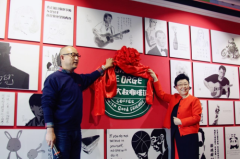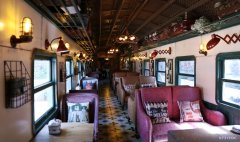The exotic menu reflects the "new retail" of catering
Walking into a coffee shop, in addition to coffee and western food, there are noodles and beef noodles, and even tin foil squid can be on the menu. The "scenery" in Chinese restaurants is also unique. Noodle shops pour coffee when mixing powder, drink milk tea while rinsing hot pot, and cold skin shops peddle desserts.
Behind each bizarre menu is a new round of "fighting" in the traditional catering industry for retail sales. The secret is that it not only expands the benefits of the category, but also prolongs the time customers spend in the store. But not all "cross-border" combinations can capture the picky appetite of customers.
Noodle shop, coffee shop, "you have me."
A few days ago, a piece of news in the catering circle went viral: a ZOO COFFEE (Zoo Coffee) in Zhengzhou launched Chongqing noodles, pea noodles, mixed sauce noodles and beef noodles, a strange combination of "coffee + noodles", which caused many users to tease and complain.
Reporters visited a number of coffee shops in Beijing, although there are no shops selling small noodles, but the "cross-border" collocation between China and the West is not uncommon. A ZOO COFFEE in Guangqu Road even specializes in tin foil electric barbecue dishes, popular dishes are tin foil squid, scallops, raw oysters, baby vegetables, etc., the shop assistant said that "every summer will sell"; in the Wuyuanqiao grass site "A+Cafe", the new products have Stewed Chicken with Three Cups Sauce set meal, mushroom stewed rice and other Chinese food, specialties are beef noodles; Yizhuang's Australian coffee sells seafood rice and chicken steak rice. At Shangdao Coffee in the East Garden of South Lake in Laiguang Camp, braised ribs and lotus leaf bullfrog have become popular dishes.
The wave of "cross-border" has also swept many Chinese noodle restaurants. Xiaoji Sanxian stewed noodles, which has a history of more than 30 years, has launched coffee; in a Chongqing noodle restaurant in Beijing's 798 Art District, three types of coffee are served with all kinds of pasta; and a Wei family cold skin restaurant in Xi'an is as famous as roast bun for all kinds of Western-style cupcakes.
Compete for the big market of white-collar simple meals
Restaurant "cross-border" is not to catch the eye, it reflects the development idea of "new retail" in the traditional catering industry.
"A lot of people leave after a cup of coffee, so we offer Chinese food that suits our users' taste." The manager of A+Cafe said that Chinese food can attract more passengers and allow many diners to come to the restaurant for special dishes. "dozens of bowls of beef noodles can be sold every day, which is the number one sales of all single products." She confessed.
A+Cafe adds light meals to attract users to come to the restaurant during lunch and dinner, while Chongqing Noodle Restaurant in 798 wants to make full use of non-meal time. "with coffee products, users can come to the store for parties or work at any time." The cashier says hundreds of cups of coffee are sold at the store every day, mostly during non-mealtime.
With fierce competition in the catering industry, "cross-border" has become a new wave. The main purpose of the brand of "hot pot + tea" is to meet the needs of users to "drink a cup at any time", so that the hot pot restaurant in the afternoon is not so empty. Starbucks once said it "rejected sandwiches" for fear of damaging the strong aroma of coffee in the store, but now it can't help selling sandwiches. Last week, Starbucks announced in a high profile that it would "start making lunch seriously and plan to double its food sales within five years."
The boundaries of the restaurant market have been blurred.
"the combination of Chinese and Western will become a feasible way for the development of catering brands." Zhu Danpeng, a researcher at the China Food Business Research Institute, said that under the trend of "new retail" in catering, the innovation of restaurant product line is imperative. However, no matter how to match, we should follow the business logic thinking. There is nothing wrong with the restaurant offering a bizarre menu, but considering positioning problems and user feedback, coffee shops selling noodles or tinfoil squid are not the best choice.
It is worth mentioning that nowadays, many coffee shops and milk tea shops have become "lifestyle experience centers", selling not only drinks and meals, but also books, furniture, flowers, smart hardware and so on. The line between Chinese restaurants and cafes is blurring, and the boundaries between restaurants and stores seem to be melting: Ali's new retail vanguard, Box Ma Xiansheng, is about to open in Beijing, accounting for a higher proportion of catering, while adding formats such as florists and Tmall supermarkets; another new retail sample, Yonghui Super species, combines Yonghui hatched salmon workshops and living kitchens.
Zhu Danpeng said that the "new retail" has given the catering industry a new round of transformation and upgrading ideas. After the retail big data has been mastered, the single store uses collocation "multiplication" to become a compound experience store, which can significantly enhance the profit potential.
Important Notice :
前街咖啡 FrontStreet Coffee has moved to new addredd:
FrontStreet Coffee Address: 315,Donghua East Road,GuangZhou
Tel:020 38364473
- Prev

Uncle Qiaozhi Cafe opened, and the founder and investor's home of the kindergarten opened.
On March 17, 2017, Uncle Qiaozhi Cafe was officially opened. Old friends got together happily and new friends became acquainted with each other. Uncle Qiaozhi Cafe officially opened as a Chinese preschool education home and incubation platform for preschool education programs. At the same time, Uncle Qiaozhi and his friends held the fourth salon. Senior figures from preschool education circles and cross-border celebrities from all over the country have launched an existing
- Next

Improve the taste of a city the old European coffee will open on April 18
Changsha's most beautiful and retro European cafe will officially open on April 18. Located in Wujiang Tianjie World Food Town, the cafe with the most European and American literary style will create a new revolution in Changsha coffee aesthetics, sweep Changsha with a new retro trend, lead a fashionable, elegant and high-quality way of life, and experience the most artistic retro feelings. A cafe, how to upgrade a city
Related
- What is the difference between Indonesian Sumatra Mantinin coffee and gold Mantinin? How to distinguish between real and fake golden Mantelin coffee?
- What does bypass mean in coffee? Why can hand-brewed coffee and water make it better?
- Unexpected! Ruixing Telunsu lattes use a smoothie machine to foam milk?!
- % Arabia's first store in Henan opens into the village?! Netizen: Thought it was P's
- Does an authentic standard mocha coffee recipe use chocolate sauce or powder? Mocha Latte/Dirty Coffee/Salty Mocha Coffee Recipe Share!
- What is the difference between Vietnam egg coffee and Norway egg coffee? Hand-brewed single product coffee filter paper filter cloth filter flat solution!
- What is the difference between sun-cured and honey-treated coffee? What are the differences in the flavor characteristics of sun-honey coffee?
- How to make Italian latte! How much milk does a standard latte use/what should the ratio of coffee to milk be?
- How to make butter American/butter latte/butter Dirty coffee? Is hand-brewed coffee good with butter?
- Is Dirty the cold version of Australian White? What is the difference between dirty coffee/decent coffee and Australian white espresso?

